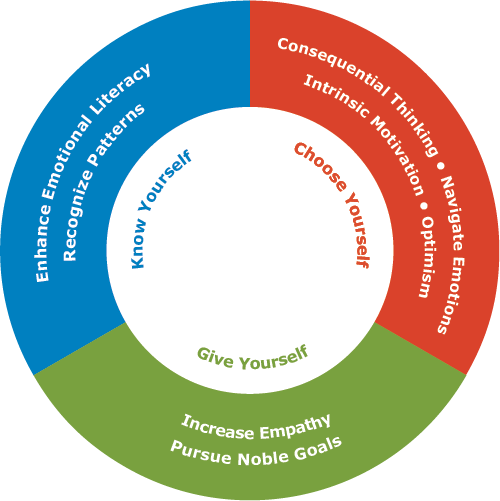Integrated and Isolated:
The Dichotomy of the Digital Era
We’re more connected than ever before, yet feel less so. How can we embrace technology and take advantage of its amazing potential, while staying connected to what’s really important?
By Michael Miller – January 8th, 2019

Welcome to the paradox of the digital era: We’re more connected, yet feel less so.
In ways unthinkable to previous generations, technology has granted us easy access and enriched our lives in countless ways. We can reunite with long lost friends, and talk to loved ones on the other side of the world for free. We can learn anything, instantly. we can publish our creations and have our words translated to dozens of languages. The world is, quite literally, at our fingertips.
At the same time, these connective technologies are amplifying serious problems. Attention is frayed, burnout is rampant, and loneliness and depression are on the rise. The mental health crisis is looming, especially among young people who have never known anything but a tech-saturated life.
The harsh reality? Many of us are spending more time on our phones and laptops than in human interactions. We have children who are being raised on devices. We are more connected than ever before, and yet people feel less connected than ever before . We look at screens to see the world around us; our lives are mediated by machines.
What’s the antidote to the digital deluge?
In Six Seconds’ research about key themes for applying emotional intelligence, this topic keeps surfacing with increasing urgency: technology, the rise of artificial intelligence, how to survive and thrive in the digital era.
It strikes a nerve because there’s an increasing awareness that society’s tremendous technological advancements are coming at a high cost to humans. Artificial intelligence is affecting our lives in nearly every aspect, and some fear it’s taking over our humanity. Have we unleashed a monster, or even lost control already? We fear that we can’t keep up, and at the same time, we can’t go back.
Big Questions on emotions & technology
What are the skills we’ll need to strengthen, individually and collectively, to navigate this era? How can we embrace technology and take advantage of its amazing potential, while also staying focused on what’s really important? How can we step forward in a way that puts us back in the driver’s seat, utilizing technology as a means to an end? How can we create adaptive, innovative organizations that see technology as an opportunity, not a destructive force?
Over the next couple months in Six Seconds’ research and publications, and this quarter’s EQ Cafés (free sessions shared by volunteer Network Leaders around the globe), we’ll explore these topics and more:
- how to utilize emotional intelligence to bring awareness and intentionality to tech use
- strategies for achieving better health and tech-life balance in the digital age
- how our emotions are shaping, and being shaped, by the algorithms that drive “user behavior”
- the latest research on kids and technology use, and tips for parents to create healthy boundaries that help kids see the pros and cons of these powerful new technologies
- insight into the New Power model of the digital age and how businesses must adapt to this new reality
The Growing Importance of Emotional Intelligence
Want practical tips to use EQ to take back control of your attention and your life? Start with this short article about how to become Indistractible, a phrase coined by Stanford professor Nir Eyal, who knows a thing or two about habit forming technologies.
In Six Seconds’ recent research on what happens when people grow emotional intelligence, a central theme is authentic connection. Emotional intelligence seems to equip us to understand and accept ourselves in a way that facilitates understanding and acceptance of others. In a time where “everything” is mediated by algorithms, this capacity for authentic human connection will become increasingly precious — this is why the World Economic Forum Future of Jobs Report lists emotional intelligence as one of the most important skills for the workforce of the 21st century. As we grapple to survive and thrive in the Digital Era, emotional intelligence will become even more crucial.
Stay up to date!
Want the latest updates and articles on emotional intelligence, including this quarter’s posts about the digital era? Sign up for our newsletter. It’s once a week and you can unsubscribe anytime, but I think you’ll find it to be refreshingly simple, practical and scientific.
What’s new in emotional intelligence?
Overcoming Urgency: How Emotional Intelligence Helps You Slow Down and Focus on What Truly Matters
If you ever feel stuck in urgency mode, emotional intelligence offers a way out — and a way back to what matters most.
Integrated Emotions: Feelings Are Allies
What if all our feelings had value? Many people see emotions as “good” or “bad” — which leaves us in a constant state of internal struggle against our own feelings. Here’s a framework to rethink feelings as valuable signals about what’s important.
The Six Seconds Model of Emotional Intelligence: What It Is and How to Use It (+ PDF)
What is emotional intelligence and how do you practice it? Explore the Six Seconds Model of Emotional Intelligence to improve your life and relationships.
Plutchik’s Wheel of Emotions: Feelings Wheel
Grow your emotional literacy with Plutchik’s Wheel of Emotions. Then download the free Practicing Emotional Intelligence eBook to go deeper!
From Enemy to Ally: How Eric Pennington Changed His Relationship with His Own Emotions – and Found His Life’s Purpose
How emotional intelligence helped Eric Pennington transform corporate life setbacks into strengths – and find purpose in both work and life.
Helping Others Achieve Overall Well-being and Healthy Connections: How Emotional Intelligence Guided Pamela Barker’s Career Path Growth
Pamela Barker’s journey began with healing bodies, but it was her discovery of emotional intelligence that unlocked her true purpose: helping others achieve overall well-being and healthy connections. From her days as a physical therapist to becoming a passionate EQ coach, Pamela’s story is one of transformation, resilience, and the power of connection. Her experience shows that real change starts from within.
- Pursue Noble Goals in the Six Seconds Model of EQ - July 29, 2023
- Increase Empathy in the Six Seconds Model of EQ - July 26, 2023
- Exercise Optimism - July 24, 2023






LE SOLICITAMOS INFORMACIÓN DEL TEMA EN ESPAÑOL, Y LUEGO PODER ACCEDER AL TALLER DEL 9 AL 13 DE MARZO 2020 EN Universidad cudec México.